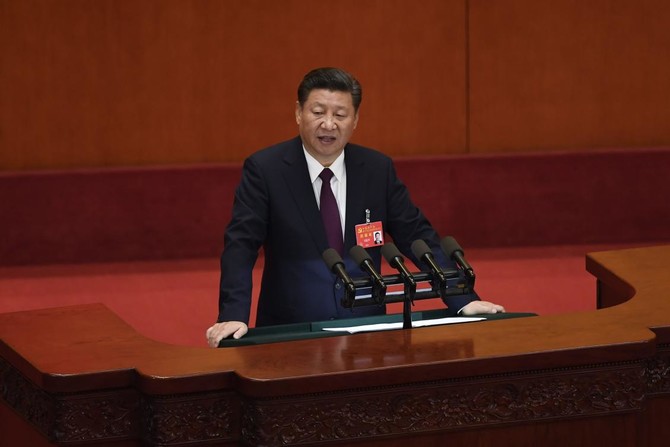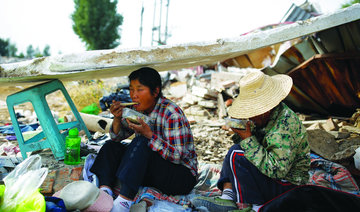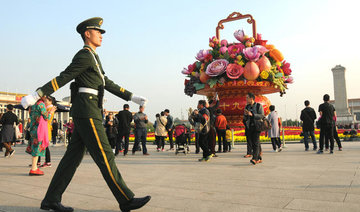BEIJING: President Xi Jinping declared China is entering a “new era” of challenges and opportunities on Wednesday as he opened a Communist Party congress expected to enhance his already formidable power.
Xi told some 2,300 delegates at the imposing Great Hall of the People that the party must “resolutely oppose” any actions that undermine its leadership as it steers a course through a high-stakes period in its development.
“The situation both domestic and abroad is undergoing profound and complex changes,” said Xi, who is expected to secure a second five-year term as general secretary and stack leadership positions with loyalists during the twice-a-decade congress.
“China’s development is still in a stage of important strategic opportunities. The prospects are bright, but the challenges are also severe,” he said in a marathon speech that exceeded three hours and was met by waves of applause.
“Socialism with Chinese characteristics has entered a new era.”
Speaking in front of a massive hammer and sickle, Xi touted his nationalistic “China dream” slogan, vowed to open the economy, promised to win the fight against poverty, and warned he would continue a “zero tolerance” campaign against corruption.
“Every one of us in the party must do more to uphold party leadership and the Chinese socialist system and resolutely oppose all statements and actions that undermine, distort or negate them,” he said.
Considered China’s most powerful leader since Deng Xiaoping or even Mao Zedong, Xi could use the congress to lay the foundation to stay atop the 89-million-strong party even longer than the normal 10 years, according to analysts.
That would break the unwritten two-term limit accepted by his immediate predecessors Jiang Zemin and Hu Jintao — who were by Xi’s side at the congress — and end the era of “collective leadership” aimed at preventing the emergence of another Mao.
Another signal of Xi’s rise to the pantheon of Chinese leadership would be if his name is added to the party constitution, an honor that has only been bestowed upon modern China’s founder, Mao, and the father of economic reforms, Deng.
Potential rivals have been swept aside under Xi’s vast anti-corruption drive, which punished 1.3 million Communist Party officials over five years.
Xi said the campaign has been “unswervingly fighting against ‘tigers’, ‘beating flies’, ‘hunting foxes’” — terms used for lower- and higher-ranking officials, as well as those who have fled abroad.
His rise has also been marked by a relentless crackdown on dissent, with authorities even refusing to free Nobel peace prize laureate Liu Xiaobo as he lay dying of cancer in July.
On other fronts, Xi touted efforts to complete the army’s modernization by 2035 and build artificial islands in the disputed South China Sea
In a stern warning to self-ruled Taiwan, which Beijing considers a rebel province, Xi said China has the “ability to defeat separatist attempts for Taiwan independence in any form.”
Xi, who has championed globalization in the face of President Donald Trump’s “America First” policies, vowed to further open up China’s economy.
Foreign companies complain that Xi’s words have not been backed by deeds, as the state retains control over the economy.
US and European firms report being barred from certain sectors and forced to share their technologies with local competitors.
Trump, who will visit Beijing next month, has launched a trade investigation into China’s intellectual property practices.
“China will not close its doors to the world, we will only become more and more open,” Xi said, pledging to “protect the legitimate rights and interests of foreign investors.”
Authorities stepped up policing for the week-long congress, with red armband-wearing “security volunteers” fanning out across the capital, karaoke bars closing and online kitchenware firms even suspending knife sales.
The conclave, which will mostly meet behind closed doors and end next Tuesday, will select new top party members, including for the Politburo Standing Committee, China’s all-powerful ruling body.
Xi and Premier Li Keqiang are expected to remain on the committee while the five other current members are supposed to step down under an informal retirement age set at 68.
Xi may lobby to retain his 69-year-old right-hand man Wang Qishan, who heads the leader’s signature anti-graft campaign. This would create a precedent for Xi himself to remain in charge beyond retirement age in 2022.
But a Xi heir apparent could emerge from the congress.
One former potential successor who was outside Xi’s circle, Sun Zhengcai, was ousted from the party last month due to graft allegations.
Chen Miner, a former Xi aide who succeeded Sun as political chief in the city of Chongqing, is now well positioned for promotion.
Xi declares ‘new era’ for China as party congress opens
Xi declares ‘new era’ for China as party congress opens

700 foreigners flee Iran to Azerbaijan, Armenia; evacuation from Israel begins

- A Czech plane carrying 66 people landed in Prague on Tuesday a day after a Slovak plane had taken 73 evacuees to Bratislava from Amman
BAKU: More than 700 foreign nationals have crossed from Iran into neighboring Azerbaijan and Armenia since Israel began striking the country last week, government officials in Baku and Yerevan said on Tuesday.
The Caucasus countries border Iran’s northwest, with the closest crossing into Azerbaijan around 500 km from Tehran by road.
“Since the start of the military escalation between Israel and Iran, more than 600 citizens of 17 countries have been evacuated from Iran via Azerbaijan,” a government source said on Tuesday.
The evacuees, who crossed the border via the Astara checkpoint on the Caspian Sea coast, are being transported to Baku airport and “flown to their home countries on international flights,” the source said.
Among those evacuated are citizens of Russia, Belarus, Kazakhstan, Kyrgyzstan, Tajikistan, Uzbekistan, as well as Germany, Spain, Italy, Serbia, Romania, Portugal, the US, the UAE, China and Vietnam. Azerbaijan shut its land borders in 2020 due to the COVID-19 pandemic and has kept them closed ever since.
“In light of the evacuation need, Azerbaijan has temporarily opened its border for those leaving Iran,” the official said.
India also evacuated 110 of its citizens from Iran through Armenia, Ani Badalyan, Yerevan’s Foreign Ministry said. Poland’s Foreign Ministry said it would evacuate part of its embassy staff in Tehran via Baku.
“We have decided to evacuate or support the departure of staff who do not need to remain in the country, so-called non-essential personnel,” Deputy Foreign Minister Henryka Moscicka-Dendys said.
“Our colleagues will try to reach the border with Azerbaijan,” she said, without specifying how many people were involved.
Turkmenistan — one of the world’s most closed-off countries — said it had also allowed the transit of around 120 people evacuated from Iran through its territory, mainly citizens of Central Asian countries.
The Czech Republic and Slovakia have taken 139 people home on government planes from Israel because of its conflict.
A Czech plane carrying 66 people landed in Prague on Tuesday a day after a Slovak plane had taken 73 evacuees to Bratislava from Amman.
“I am glad they are all OK. The transport was really demanding in the difficult environment,” Czech Defense Minister Jana Cernochova said about the Czech flight on social media site X.
The Defense Ministry said most of the 66 evacuees were Czech nationals. “It was not possible to send the army plane straight to Israel,” the ministry said, citing the air-space closure.
“The evacuees were taken to the airport in the neighboring country by buses. They crossed the border on foot.”
Czech media said a convoy with the evacuees had left Tel Aviv on Monday morning and boarded the plane in Sharm El-Sheikh, Egypt.
A Slovak government plane with 73 passengers, mostly Slovaks, landed in Bratislava on Monday.
France urged to apologize for Polynesia nuclear tests

- Tens of thousands of people in the French overseas territory are estimated to have been exposed to harmful levels of radiation
- France conducted 193 nuclear tests in French Polynesia from 1966 until 1996
PARIS: Paris should apologize to French Polynesia for the fallout of nuclear tests there over three decades, which led to harmful radiation exposure, a French parliamentary report released on Tuesday said.
France conducted 193 nuclear tests in French Polynesia from 1966, especially at the Pacific archipelago’s Moruroa and Fangataufa atolls, to help build up its atomic weapon arsenal. These included atmospheric and underground tests which had severe health impacts.
Tens of thousands of people in the French overseas territory are estimated to have been exposed to harmful levels of radiation, leading to a significant public health crisis that has been largely ignored.
The tests remain a source of deep resentment in French Polynesia, where they are seen as evidence of racist colonial attitudes that disregarded the lives of islanders.
“The inquiry has strengthened the committee’s conviction that a request for forgiveness from France to French Polynesia is necessary,” the report said.
“This request is not merely a symbol, nor a request for repentance. It must be a... fundamental step in the process of reconciliation between French Polynesia and the State,” the authors said.
The report said the apology must be added to a 2004 law on French Polynesia’s semi-autonomous status.
Residents in the south Pacific Ocean islands are hoping for compensation for radiation victims.
The investigative website Disclose, citing declassified French military documents on the nearly 200 tests, reported in March that the impact from the fallout was far more extensive than authorities let on.
Only a few dozen civilians have been compensated for radiation exposure since the tests ended in 1996, Disclose said.
Four heavy US bombers stationed at key Indian Ocean base: image analysis

- The Pentagon said it was sending 'additional capabilities' to the Middle East amid an escalation of the Iran-Israel conflict
PARIS: Four US Stratofortress bombers are currently stationed at the Diego Garcia base in the Indian Ocean, according to an AFP analysis of satellite imagery, as the conflict between Israel and Iran extended to its fifth straight day.
The base, leased to the United States by Britain, is one of its key military facilities in the Asia-Pacific region, and was used as a hub for long-range bombers and ships during the wars in Afghanistan and Iraq.
The four B52H Stratofortresses, which can carry nuclear weapons or other precision-guided munitions, were spotted on a southern tarmac at Diego Garcia on Monday at 0922 GMT.
Images provided by Planet Labs indicate they arrived in mid-May.
A C-17 Globemaster III troop and cargo transport plane is also at the base, according to the AFP analysis, as well as six jets likely to be KC-135 airborne refueling tanker.
The Pentagon said Monday that it was sending “additional capabilities” to the Middle East amid an escalation of the Iran-Israel conflict, while the aircraft carrier USS Nimitz canceled a Vietnam visit to head toward the Indian Ocean according to Marine Traffic, a ship-tracking site.
Washington has also redeployed around 30 refueling planes toward bases in Europe.
US spies said Iran wasn’t building a nuclear weapon, Trump dismisses that assessment

- The country was not building a nuclear weapon, the national intelligence director told lawmakers
- Gabbard brushed off the inconsistency, blaming the media for misconstruing her earlier testimony and asserting that “President Trump was saying the same thing that I said“
WASHINGTON: Tulsi Gabbard left no doubt when she testified to Congress about Iran’s nuclear program earlier this year.
The country was not building a nuclear weapon, the national intelligence director told lawmakers, and its supreme leader had not reauthorized the dormant program even though it had enriched uranium to higher levels.
But President Donald Trump dismissed the assessment of US spy agencies during an overnight flight back to Washington as he cut short his trip to the Group of Seven summit to focus on the escalating conflict between Israel and Iran.
“I don’t care what she said,” Trump told reporters. In his view, Iran was “very close” to having a nuclear bomb.
Trump’s statement aligned him with Israeli Prime Minister Benjamin Netanyahu, who has described a nuclear-armed Iran as an imminent threat, rather than with his own top intelligence adviser. Trump was expected to meet with national security officials in the Situation Room on Tuesday as he plans next steps.
Gabbard brushed off the inconsistency, blaming the media for misconstruing her earlier testimony and asserting that “President Trump was saying the same thing that I said.”
“We are on the same page,” she told CNN. Asked for comment, Gabbard’s office referred to those remarks.
In her March testimony to lawmakers, Gabbard said the intelligence community “continues to assess that Iran is not building a nuclear weapon and Supreme Leader Khamenei has not authorized the nuclear weapons program he suspended in 2003.”
She also said the US was closely monitoring Iran’s nuclear program, noting that the country’s “enriched uranium stockpile is at its highest levels and is unprecedented for a state without nuclear weapons.”
Trump’s contradiction of Gabbard echoed his feuds with US spy leaders during his first term, when he viewed them as part of a “deep state” that was undermining his agenda. Most notably, he sided with Russian President Vladimir Putin in 2018 when asked if Moscow had interfered in the 2016 election, saying Putin was “extremely strong and powerful in his denial.”
The latest break over Iran was striking because Trump has staffed his second administration with loyalists rather than establishment figures. Gabbard, a military veteran and former Democratic congresswoman from Hawaii, was narrowly confirmed by the Republican-controlled Senate because of her scant experience with intelligence or managing sprawling organizations.
Gabbard, who left the Democratic Party in 2022 and endorsed Trump in last year’s election, is expected to testify Tuesday in a closed session on Capitol Hill, along with CIA Director John Ratcliffe, during a previously scheduled budget hearing.
Both officials likely would face questions about their views on Iran and Trump’s latest statements. A representative for the CIA did not immediately respond to requests for comment.
The head of the International Atomic Energy Agency has repeatedly warned that Iran has enough enriched uranium to make several nuclear bombs should it choose to do so. Iran maintains its nuclear program is peaceful.
An earlier intelligence report, compiled in November under then-President Joe Biden, a Democrat, also said Iran “is not building a nuclear weapon.”
However, it said the country has “undertaken activities that better position it to produce one, if it so chooses,” such as increasing stockpiles of enriched uranium and operating more advanced centrifuges. The report did not include any estimates for a timeline for how quickly a bomb could be built.
Trump’s immigration agenda is another place where he’s split with intelligence assessments. He cited the Alien Enemies Act, a 1798 wartime law, to deport Venezuelan migrants, which he justified by claiming that the Tren de Aragua gang was coordinating with the Venezuelan government. However, an intelligence assessment in April found no evidence of that.
Gabbard fired the two veteran intelligence officers who led the panel that created the assessment, saying they were terminated because of their opposition to Trump.
In response to those reports, the White House released a statement from Gabbard supporting the president.
“President Trump took necessary and historic action to safeguard our nation when he deported these violent Tren de Aragua terrorists,” the statement said. “Now that America is safer without these terrorists in our cities, deep state actors have resorted to using their propaganda arm to attack the President’s successful policies.”
India evacuates students from Tehran as Israel hits civilian sites

- About 6,000 Indian students are enrolled in Iranian universities
- So far 110 studying in Urmia have left the country through Armenia
NEW DELHI: India’s Foreign Ministry said on Tuesday it was moving Indian students out of Tehran, as many sought safety after their universities were shut down amid ongoing Israeli airstrikes.
Israeli attacks on Iran started on Friday, when Tel Aviv hit more than a dozen sites — including key nuclear facilities, residences of military leaders, and of scientists — claiming they were aimed at preventing Iran from developing nuclear weapons.
Daily attacks have been ongoing for the past five days after Iran retaliated with ballistic missile strikes against Israel.
As the Israeli military intensified its bombing of civilian targets, hitting Iran’s state broadcaster on Monday, stranded foreigners — including 6,000 Indian students — have been struggling to leave.
“Most of the students here were living in apartments, including me and my friend. The first blast in Tehran happened in Sa’adat Abad district, where me and my friend were living,” Hafsa Yaseen, a medical student at Shahid Beheshti University, told Arab News.
“One of our university’s nuclear scientists was martyred in these blasts. Situation is really bad.”
According to the Iranian Ministry of Health and Medical Education, at least 224 people have been killed and 1,481 wounded in Israeli attacks since Friday. Most of the casualties have been reported in Tehran.
India’s Ministry of External Affairs confirmed in a statement that it was moving those studying at universities in the Iranian capital “out of the city for reasons of safety.”
Yaseen was among a group of a few hundred students moved on Monday to Qom, 140 km south of the capital city.
“Me and my friend were frightened, and we just thought it’s our turn now to die. We were literally calling our parents and telling them goodbye,” she said.
“We are not even safe here, because we are still in Iran (and) anything can happen ... We are in constant fear that we might die and our families are more stressed than us. I just want to request the government of India to evacuate us from here as soon as possible.”
A group of 110 Indian students from Urmia University of Medical Sciences in northwestern Iran has already been assisted by the Indian authorities to leave through the land border with Armenia.
“All the Indian students who had crossed the Iran-Armenia border have now safely reached the capital city, Yerevan. This includes around 90 students from Kashmir Valley, along with others from various Indian states,” said Nasir Khuehami, national convenor of the Jammu and Kashmir Students Union.
“Their flight from Armenia to Delhi is scheduled for tomorrow, with all necessary arrangements being facilitated in coordination with the Indian authorities. This comes as an immense relief to the families.”
The families of those remaining in Iran have been pleading with Indian authorities to also bring them home.
“Please save my daughters. My two daughters study (at) Shahid Beheshti University. They are in great panic — the situation in Tehran is so bad that students are in great panic,” one of the mothers, Mubeena Ali, told Arab News through tears.
“They have been shifted to Qom but they feel afraid ... They are greatly distressed. They want to be evacuated.”






















